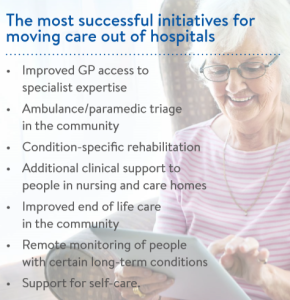Liz Zacharias, Senior Consultant at Campbell Tickell, discusses the findings from “Shifting the balance of care” a report carried out by Nuffield Trust.
Moving care into the community has been a goal for health policy in England for a long time, and is a key element of many of the Sustainability and Transformation Plans (STPs) and the newly minted approach of ‘accountable care’. Where does the latest policy thinking leave housing and care providers in terms of their role of supporting the delivery of effective community-based care and what opportunities does it present? The King’s Fund has defined accountable care as aiming “to improve population health by tackling the causes of illness and the wider determinants of health. Some forms of accountable care involve local authorities and the third sector alongside NHS organisations in working towards these objectives”.
Review of care initiatives
A report from the Nuffield Trust (March 2017) makes for interesting reading in this context. Shifting the Balance of Care, Great Expectations reviewed STPs and carried out an in-depth literature review of 27 initiatives that were moving care out of hospitals, to see what their impact had been, particularly on cost. The report looked at five areas of healthcare initiatives:
• changes in the elective care pathway;
• changes in the urgent and emergency care pathway;
• time-limited initiatives aimed at avoiding hospital admissions or facilitating early patient discharge;
• managing ‘at-risk’ populations including end-of-life care and people in nursing homes;
• support for patients to care for themselves and access community resources.
The last three of these points are of interest to housing providers and are where the sector has many examples of success. The review looked at academic research and robust evidence from randomised control trials and other accepted methodologies for systematic objective review.It showed that the most positive evidence was for six initiatives (see box: The most successful initiatives for moving care out of hospitals).
The report makes the point that: “There are 15 million people living with long-term conditions and over 2 million with multiple long-term conditions. Together they account for 55% of GP appointments and 77% of inpatient bed days.” Initiatives that reduce the call on health services, by promoting self-care, can therefore provide significant savings. However the report highlights that for this to work a change in mindset is required among professionals and patients, as well as greater digital literacy.
One area where there is emerging positive evidence of an initiative that saves costs and improves health outcomes is ‘social prescribing’. This is where GPs refer patients with social, emotional or practical needs to a range of local non-clinical services, often provided by the voluntary and community sector, rather than giving a medical prescription. The report found mixed evidence on other areas such as ‘hospital at home’ initiatives and shared care models, as well as intermediate care services. Success here is much more about local implementation, having clear referral criteria, and integrated working between health and social care.
The challenges ahead
The Nuffield Trust also set out a raft of challenges in delivering economic benefit and system-wide savings. These include the use of prices to calculate savings rather than costs, assuming that overhead or fixed costs can be fully taken out. Initiatives aimed at reducing over-use can also have the effect of stimulating demand by uncovering unmet need. There is an important lesson here for housing and care providers.
It may be tempting to press the merits of a good housing-based model (such as reablement, or intermediate care). However, organisations must remember the jury is still out on the actual savings that can be made. At present, it may be more effective to alter the approach towards tenants and service users to focus on developing people’s ability to take control of their health and wellbeing and make better use of digital resources. Community-based healthcare provision clearly has a large role to play in future, and housing and care providers need to be savvy to ensure they are seen as being at the heart of this solution.
Read the full report by the Nuffield Trust here.
To discuss the issues raised in this article, contact liz.zacharias@campbelltickell.com
This article also appeared in the CT Brief, Issue 33: Care & Support edition



